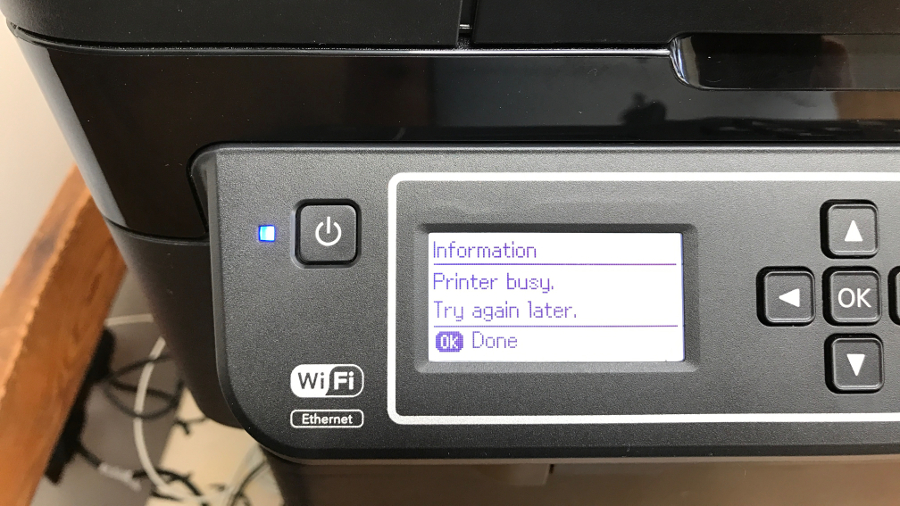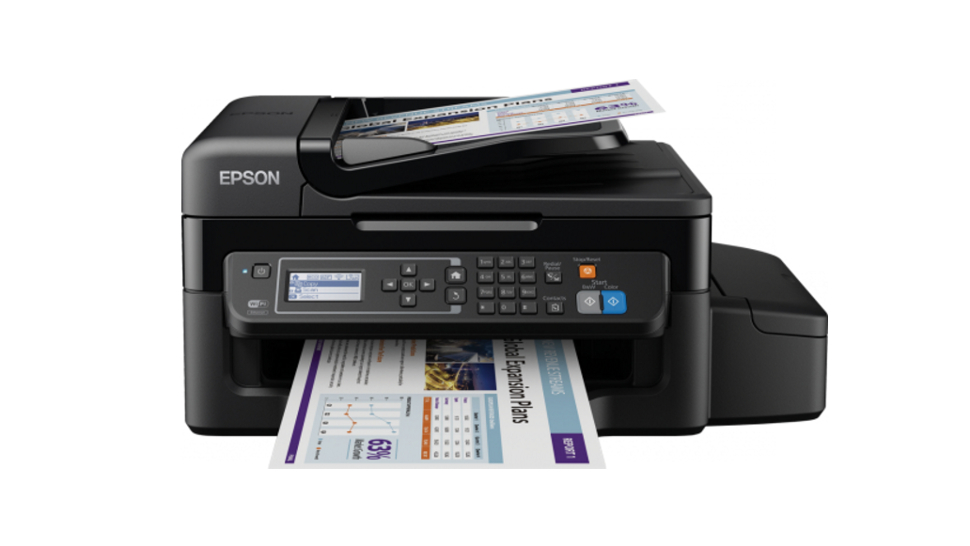TechRadar Verdict
There’s a compelling financial case for refillable ink tanks, but this MFP comes with downsides in terms of a bulky form-factor, and somewhat compromised print quality. There are also question marks over reliability here.
Pros
- +
Claimed up to 70% more prints than cartridges
- +
High yields of 11,000 pages possible
- +
Duplex double-sided printing
- +
Clearly visible ink levels
Cons
- -
Bulky – especially with overhanging ink-tanks
- -
Our sample was prone to paper jams
- -
Does not fold flat
- -
Difficult to enter text via crude interface
Why you can trust TechRadar
Epson’s extensive product range includes the EcoTank series, the first printers to use bottled ink rather than closed cartridges. The EcoTank ET-4500 is a multifunction model that looks remarkably like the Epson Workforce WF-2650, except for the very visible liquid ink tanks attached to its side.
Like the WorkForce printer, the EcoTank can print, scan, copy and fax, plus it offers similar connectivity through Wi-Fi and USB, with a companion app to make printing from a mobile device especially easy. In fact, the biggest difference is the price – instead of £100 (around $130, AU$175) or so, the EcoTank costs £350 (around $450, AU$600). So although you are excused from buying Epson’s expensive refill cartridges, the initial outlay is painful.
Okay, so for this kind of money, you could buy a high-end model like the all-singing, all-dancing HP PageWide Pro 477dw, but in the long-term, your printing costs would be much higher with the HP device.

Design and build
The form-factor is familiar enough, with paper documents feeding in from the back and ejecting at the front, while the top tray lifts to reveal the scanner, and the whole upper section is hinged to reveal the inkjets and rollers. We had to use this access hatch often to address paper jams, unfortunately.
Unlike the discrete Kodak Verité 65 Plus, the trays and LCD do not fold away neatly, and there’s no possibility of stacking papers on top of this printer, or indeed fitting it in a drawer.
The ink reservoirs are housed in a bulbous lump of plastic that hangs from the right-hand side and pipes the ink to modified cartridges situated in the usual location. It all looks a bit Heath Robinson, but the advantage is clear. Instead of the criminally wasteful cartridge system, you can see through the little windows just how much ink is left, and top up each of the five tanks with a careful squirt of Epson’s bottled ink.
Here are the full specs of the Epson EcoTank ET-4500:
Type: Multifunction colour inkjet printer
Functions: Print, copy, scan, fax
Ink: Colour, bottled ink (C, M, Y, BK)
Connectivity: Ethernet, Wi-Fi, NFC, USB
Data storage slot: No
Print speed: 9 ppm (mono), 4 ppm (colour)
Document tray capacity: 35 sheets
Print quality: 4,800 x 1,200 dpi
Scan quality: 2,400 x 1,200 dpi
Apple AirPrint: Yes
Google Cloud Print: No
App support: Yes (iOS/Android)
Consumables included: 2-years ink supply
Size/Weight: 490 x 337 x 229mm (H x W x D); 33kg
Features
This is a fairly basic multifunction printer that has your printing, scanning, copying and faxing needs covered, but doesn’t offer luxuries like a touchscreen interface, high-speed printing, or NFC connectivity.
What you do get is a four-line mono LCD screen with cursor buttons to navigate it, along with a crude keyboard for entering text. You’ll need to use this to type in your Wi-Fi password, as the equally crude companion app will not get this printer online for you.
The Epson iPrint app makes it easier to scan documents to, and print documents from, your phone. It also offers a shortcut to Epson’s shop, where you can order more ink.
Setup and operation
The user instructions unfold into a large poster and they’re quite straightforward. They also include a QR code, so that your phone can download and display the relevant steps. The printer’s setup wizard takes you through the procedure, which only gets difficult when you have to enter the password needed to join your home Wi-Fi network. The little keyboard seems to be lacking a shift key, which stalled us for a while.
Once you’re connected, however, the functions of the control panel keys are fairly obvious, with separate buttons for printing in colour or mono.
As mentioned, the companion app is useful for scanning and printing from your phone, but surprisingly little else. Printer manufacturers seem determined to ignore the Internet of Things movement that has revolutionised other categories of devices. Why do we need to persevere with a four-line mono LCD and four cursor buttons when we just connected a darn smartphone?

Performance
The ET-4500’s performance was somewhat disappointing at first. Beginning with black text on plain A4 paper, the Epson’s results looked fine until compared with a printer of a similar price. The HP LaserJet Pro MFP M227fdw, for example, is far more precise and able to print much smaller characters. With regular 12-point text, the Epson already comes close to letting the letters join together. Comparing the two, it’s almost as if one document was written in ballpoint pen and the other with a felt tip.
Colour prints and photos, on the other hand, are handled very well by the ET-4500, as we have come to expect from Epson printers. There’s no smearing and photos printed on photo paper are brought to life by the bright colours.
At around 9 pages per minute, the print speed is not fast, unless you switch to Draft mode. This almost doubles the page rate at little cost to the quality of plain text documents. Duplex printing on both sides of the paper is a real bonus when you’re churning out the pages, too.
It’s difficult to make judgments on reliability with a short-term test, but we had repeated problems with paper jamming in our printer. The review model Epson sent for assessment looked like it had been around the block a few times, so perhaps it was damaged in transit, but even so, this doesn’t inspire confidence.

Jim has been evaluating printers for more than twenty years and has, to date, written over a hundred reviews for TechRadar Pro. From pocket printers to industrial dye sublimation, Jim has been there, run the tests and printed the t-shirt. His expertise extends to consumables (paper, ink, toner) and his printer buying guides make it easy to compare these essential peripherals.
